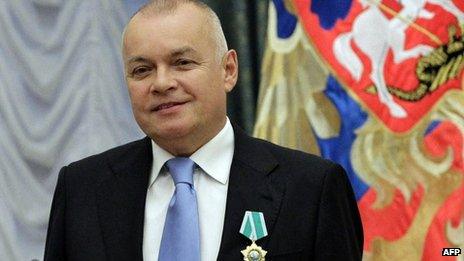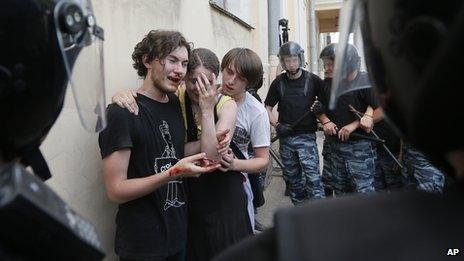Homophobia spreads in Russian media
- Published

Dmitry Kiselev has led state media attacks on Russia's gay community and now heads a major news organisation
The Russian authorities have been widely criticised for enacting a law banning the promotion of homosexuality among children.
A rising tide of homophobia in parts of the media has accompanied and followed the adoption of that law, including attempts to implicate homosexuals in a recent series of terror attacks.
The controversy surrounding the so-called "anti-gay" law passed by the State Duma (parliament) last June had the paradoxical effect of dramatically raising the profile of homosexuality in both social and mainstream media. But it has also led to an upsurge in homophobia.
On Twitter, for example, the incidence of the main pejorative terms used to describe gays ("pidoras" and its variants) increased ten-fold between the beginning of 2011 and the second half of 2013 - from around 7,000 a month to more than 70,000.
The incidence of the more educated but no less offensive term "sodomite" also soared - from being used just two or three times a day at the beginning of 2011 to more than 100 times at the end of 2013.
'Sodomite tsunami'
These increases may in part be attributable to the overall growth of Twitter in Russia during this period, but similar trends can also be observed in the mainstream media.
The media monitoring organisation Medialogiya, external says the number of news reports referring to homosexuality on official TV channel Rossiya 1 has skyrocketed over the past few years. In 2011, there were just 11, whereas in 2013 there were more than 160.
Almost all of these reports displayed an attitude that was either outright hostile or else noticeably negative towards homosexuals.
The man spearheading Rossiya 1's attacks on the gay community is Dmitry Kiselev, anchor of the channel's flagship weekly news review Vesti Nedeli.
The programme's attacks on the LGBT community have been remorseless. It has portrayed, external them as an "aggressive minority" opposed to "parents fighting to give their children a healthy upbringing". It has also suggested, external that "40% of children brought up by homosexuals have venereal diseases".
Dmitry Kiselev told, external another programme on Rossiya 1 in 2012 that the hearts of homosexuals killed in car accidents "should be buried or burnt as unfit for prolonging anybody's life".
Another staunchly anti-gay voice on Rossiya 1 is senior journalist Arkady Mamontov, who on a prime-time talk show suggested, external that Russia was in danger of being engulfed by a "homosexual sodomite tsunami".
Not all of Russia's state-controlled TV channels share Rossiya 1's taste for gay-bashing. Channel One's news programmes, for example, refer to homosexuality far less frequently and never in the same derogatory terms.
Some of its programmes have exhibited a much more positive attitude to homosexuals. A recent drama series about the Soviet film industry featured a sympathetic gay character being cruelly persecuted for his sexuality.

Police shield gay rights activists who were attacked in St Petersburg
'Gay jihad'
Still, there is no doubt that hostile attitudes to homosexuals have the blessing of the Kremlin. In December, Dmitry Kiselev was appointed head of Russia Today, a major new news organisation tasked with communicating Moscow's message to a global audience.
Liberal commentators are deeply troubled by the rising tide of homophobia. Russian-born US activist Larry Poltavtsev writes, external that just as everything Jewish was anathema to the Nazis, so "now everything that stands apart from President Putin and his team is deemed to be 'gay'."
He cited a news agency report, external referring to a "gay jihad", which suggested that homosexuality was rife among the terrorists responsible for the recent bomb attacks in the city of Volgograd.
This is not the only instance of fingers of blame being pointed at the gay community over the blasts. Controversial Orthodox clergyman Andrei Kurayev suggested, external that one of the bombers may have converted to Islam because of the "cancer" of homosexuality in the Russian Orthodox Church (ROC) in the Russian region of Tatarstan.
'Orthodox fascism'
Russian Orthodox Church clergy have in general supported the hostility towards homosexuals. One TV presenter, Olga Bakushinskaya, dubs it "Orthodox fascism", external.
In December an actor and former Orthodox priest, Ivan Okhlobystin, outraged liberals by telling, external an audience in Siberia that he would "shove all gays live into an oven". Mr Okhlobystin is one of Russia's most influential voices on social media, with more than 790,000 followers on Twitter, external.
Laws targeting homosexuals and mounting media homophobia are making life ever more precarious for Russia's beleaguered gay community.
A recent report by the Russian LGBT network said LGBT people were facing a climate of "general discrimination and violence". It said a survey showed that over the past year 53% had faced "psychological violence" and 15% actual physical harm. In at least two cases in 2013, this violence proved fatal.
BBC Monitoring, external reports and analyses news from TV, radio, web and print media around the world. For more reports from BBC Monitoring, click here. You can follow BBC Monitoring on Twitter , externaland Facebook, external.
- Published7 November 2013
- Published2 September 2013
- Published13 August 2013
- Published28 October 2013